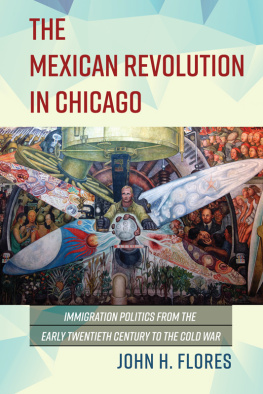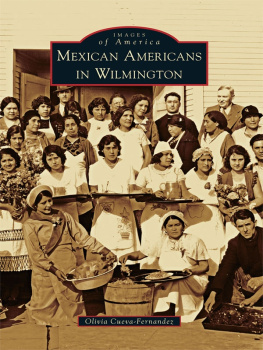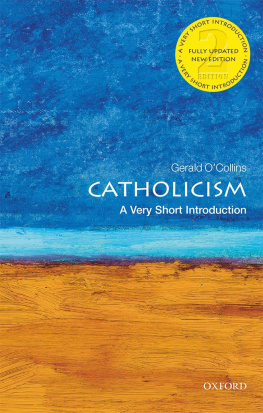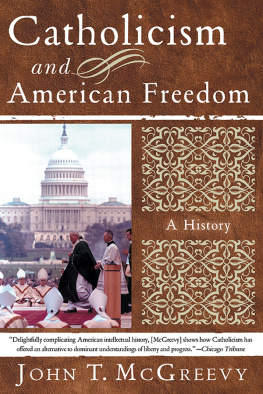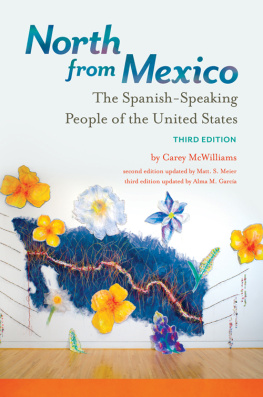2006 The University of North Carolina Press
All rights reserved
Manufactured in the United States of America
Designed by Rebecca M. Gimnez
Set in Monotype Dante
by Keystone Typesetting, Inc.
The paper in this book meets the guidelines for permanence and
durability of the Committee on Production Guidelines for Book
Longevity of the Council on Library Resources.
Library of Congress Cataloging-in-Publication Data
Trevio, Roberto R.
The church in the barrio : Mexican American ethno-Catholicism in Houston / Roberto R. Trevio.
p. cm.
Includes bibliographical references and index.
ISBN-13: 978-0-8078-2996-7 (cloth: alk. paper)
ISBN-10: 0-8078-2996-x (cloth: alk. paper)
ISBN-13: 978-0-8078-5667-3 (pbk.: alk. paper)
ISBN-10: 0-8078-5667-3 (pbk.: alk. paper)
eISBN : 9780807877319
1. Church work with Mexican AmericansTexasHouston.
2. Catholic ChurchTexasHoustonHistory. 3. Houston (Tex.) Church history. I. Title.
BV4468.2.M48T74 2006
282'.7641411'08968dc22 2005022338
cloth 10 09 08 07 06 5 4 3 2 1
paper 10 09 08 07 06 5 4 3 2 1
Portions of this work have appeared, in somewhat different form, in Roberto R. Trevio, Facing Jim Crow: Catholic Sisters and the Mexican Problem in Texas, Western Historical Quarterly 34, no. 2 (Summer 2003): 13964 ( Western History Association; reprinted by permission); and In Their Own Way: Parish Funding and Mexican-American Ethnicity in Catholic Houston, 19111972, Latino StudiesJournal 5 (September 1994): 87107 (reprinted by permission).
Para mis padres,
Gernimo R. Trevio (19201995)
and
Hilaria R. Trevio,
mis primeros y mejores maestros
Preface
Igrew up in a very Catholic culture, even though I am not Catholic. I spent my early childhood in Mathis, a speck on the rural landscape of the South Texas Gulf Coast, where almost everyone was Mexican and Catholic. My Presbyterian parents home was next door to my Catholic grandparents, within walking distance of several aunts, uncles, and cousinsall Catholicand almost literally surrounded by Mexican American Catholic friends and acquaintances. Six days of every week I lived and played in a largely Catholic world; alongside my brothers, my Catholic cousins were my best friends and constant companions, my Catholic grandparents, aunts, and uncles a source of knowledge, emotional succor, delicious food, and entertainment. But on Sundays we went our separate ways. They went to Mass (however infrequently, I noted jealously) and we unfailingly attended services either at the local Menonite Church or at our Iglesia Presbiteriana Mexicana in what seemed to be faraway Beeville, some thirty miles down the highway. Later, in Houston, Mexican American Catholicism would also permeate much of my social and professional life. Indeed it still does.
Growing up as a minority within a minority, I compared myself and my mothers Protestant side of our family to my fathers Catholic side, and wondered about that familiar yet foreign world that enveloped me. As a child I never entered a Catholic church but I distinctly recall wondering what it would be like to go inside. My Catholic familys religious world remained mysterious to me despite the familiarity it came to have for me through all I experienced of it as a childthe flickering votive candles casting a warm glow on pictures of relatives and saints; the ever-present Guadalupana gracing calendars year after year; and the occasional gentle teasing that reminded us we were the aleluyas (Protestants) of the Trevio clan. None of this difference and mystery mattered much to me as a childwe were all family and friends, all simply mexicanos. But as an adult I became increasingly intrigued by Catholicisms pervasiveness and potency in my peoples history and culture. I sensed that this religiosity that had always been everywhere around and so close to me was at the core of the Mexican American experience; I wanted to know how this could be. This book is the result of those long-gestating ruminations. Reflecting on how I have tried to understand my family and my people through their religious history, I realize that I have been working on this book for a very long time.
Many people helped me write this book. The project began as a doctoral dissertation at Stanford University, where a Mellon Fellowship in the Humanities, a Ford Dissertation Fellowship, and the Department of Historys Fellows Program generously funded six years of graduate study. I also benefited greatly from two postdoctoral opportunities, the Pew Program in Religion and American History at Yale University and the Young Scholars in American Religion Program at Indiana UniversityPurdue University at Indianapolis. I am grateful to these organizations for helping me become a historian.
The professionalism and patience of many archivists, librarians, and women and men of the Catholic Church greatly facilitated my research. At the Archives of the Oblate Fathers of Mary Immaculate in San Antonio, the late Father William Watson and his assistants, Gladys Novak and Gloria Pantoja, led me to a wealth of information. Sister Mary Paul Valdez and the late Sister Theresa Joseph Powers provided many useful documents and oral history leads at the Archives of the Congregation of the Sisters of Divine Providence, San Antonio. Brother Michael Grace likewise made useful suggestions and pointed me to important materials during my visit to the Archives of Loyola University of Chicago. I am grateful to Bishop Joseph A. Fiorenza for access to the Archives of the Diocese of Galveston-Houston, to Monsignor Daniel Scheel, who facilitated my research at the Galveston-Houston Chancery and in various parishes in Houston, and to Mary Acosta, Marion Zientek, Bob Giles, and Lisa May, who made my research in Houston very fruitful. I greatly appreciate Bishop John Mc-Carthys graciousness during my research at the Catholic Archives of Texas in Austin, his contagious enthusiasm for church history and politics, and his interest in my research. In Austin, archivists Michael Zilligen and the late Kinga Perzynska gave me invaluable help. The staff at the Stanford University libraries gave me crucial support, and I am particularly indebted to Sonia Moss. In Houston, Louis Marchiafava and his staff at the Houston Metropolitan Research Center were ever forthcoming and helpful, and I am especially grateful to my friend and respected colleague Dr. Thomas H. Kreneck, who opened many doors for me in the Bayou City and beyond and gave me generous and expert guidance. I am also greatly indebted to the parishioners who graciously opened their homes and hearts to me and taught me much about the Mexican American Catholic experience in Houston; without them this book would be much poorer.
Additionally, I have been blessed with the friendship and tutelage of outstanding individuals who have shaped my intellectual development and the writing of this book. My fellow Tejanos, Tatcho Mindiola, Arnoldo De Len, and Tom Kreneck, have long been sources of encouragement and good counsel. Similarly, I was also helped along the way by such exemplars as Anne Butler, Clyde Milner, Neil Foley, Ramn Gutirrez, James Kirby Martin, George Fredrickson, Renato Rosaldo, Jon Butler, Harry Stout, Philip Gleason, and my former colleagues in the Department of History at the University of Colorado at Colorado Springs, particularly Harlow Sheidley. At the University of Texas at Arlington my history department colleagues have been ever supportive, as have my colleagues at the Center for Mexican American Studies. I am especially thankful for those individuals who took time from their busy lives to comment on all or parts of the manuscript. Timothy M. Matovinas close and repeated readings of the entire manuscript provided challenging questions that significantly improved my work. Others, including Rudy Busto, John McGreevy, Arnoldo De Len, Gilberto Hinojosa, Jay P. Dolan, and Christian Zlolniski, also generously shared their time and wisdom to help me strengthen this book. For his steadying influence early in my career and unfailing support over the years I am grateful to my friend and mentor, Professor Albert M. Camarillo. My sincere thanks also go to senior editor Charles Grench and his fine staff. I will be ever grateful for Chucks crucial encouragement and guidance, and for the skill and professionalism shown by the individuals at UNC Press who helped bring this work to fruition.


